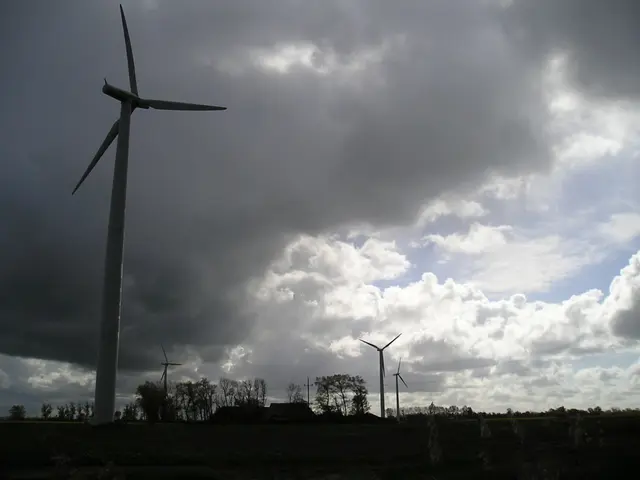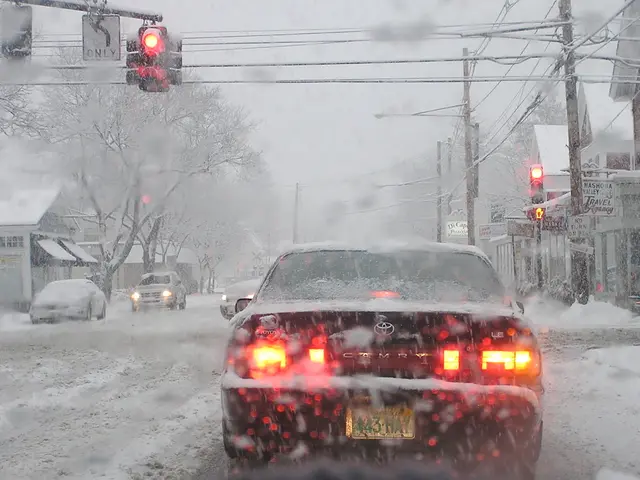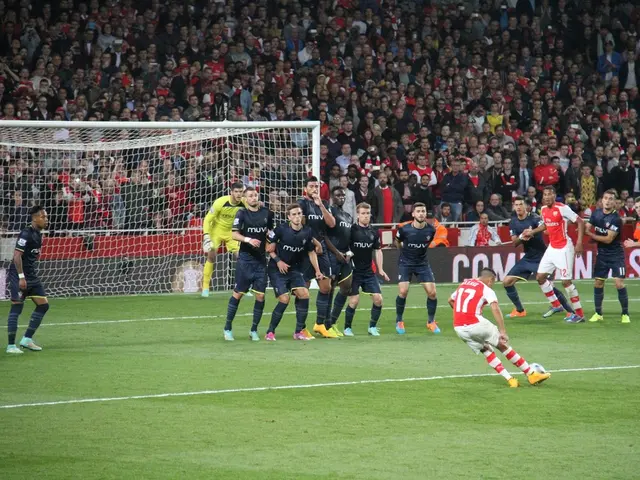Veterans' sorrow revisited at Vietnam War commemoration, vulnerable emotions resurface alongside a sense of tranquility
In the heart of Washington D.C., on a lovely day brimming with azaleas and warm sunshine, a crowd gathered around the Vietnam Veterans Memorial. The 50th anniversary of the war's end went almost unnoticed by most, as visitors got caught up in conversations about the past and the ones they'd lost. Amidst the tourists and veterans, Dan Creed, a volunteer and veteran himself, contemplates the changing narratives surrounding the Vietnam War.
Creed, a 76-year-old living in Fairfax, Virginia, once thought his command's success, which saw no casualties during his tenure in the 101st Airborne, was his proudest accomplishment. But after his children grew into successful adults, he found a new source of pride in their happiness.
The Vietnam War, a decades-long conflict once at the heart of American culture and division, seems to have taken a backseat in America's collective consciousness. The memorial, usually drenched in sobs and mournful cries, buzzed with whispers and reminiscences, laden with melancholy but tinged with time's healing touch.
"I had so much anger and frustration that for years I couldn't talk about it," said Dan Moore, 80, another veteran who lives in McLean, Virginia. "A lot of the stuff that tormented me for so long, it has passed."
Tim O'Brien, a celebrated author who wrote "The Things They Carried," a semi-autobiographical work set during his time in Vietnam, shared a similar sentiment. Once a staunch supporter of his decision to serve, he now believes he made a mistake. "I shouldn't have gone," O'Brien said.
Tran Van Ly, a former South Vietnamese officer, stands out in the crowd for his military uniform and strong stance against communism. After escaping from Vietnam in 1991, he never returned, swearing never to set foot in his homeland. But recently, his perspective has softened. His country has changed, he says, and he feels a glimmer of hope.
For Carolyn Watson, a first-time visitor at the memorial, the sadness is still fresh. Her father, Milford Marvin Tognazzi, was killed in Vietnam in 1969, when she was only 10 years old. But she finds comfort in the fact that his sacrifice helped her family, a sentiment Watson only discovered over time.
Veterans like Dan Creed are a testament to the evolving narratives surrounding the Vietnam War. The war's legacy no longer dominates conversations as it once did. Instead, hearts ache for the men who didn't return home, and families find solace in the promise of a new generation's understanding.
As the crowd disperses, one thing is clear—the Vietnam War may have ended 50 years ago, but its impact continues to reverberate, shaping stories, histories, and perspectives. It serves as a stark reminder of the human cost of conflict and the enduring power of resilience.
© 2025 The New York Times Company
Enrichment Data:
Overall:
As we commemorate 50 years since the end of the Vietnam War, it's essential to understand the shifting perspectives and narratives over time. Key aspects of these changes, both in veterans, family members, and society at large, are identified below:
Changed Perspectives Over Time
- Healing and Growth: With the passage of time, it's evident that many who lived through the Vietnam War have found solace in healing and growth. The pain of loss and trauma has lessened, enabling better communication and understanding of the war's impact.
- Challenging Stereotypes: The Vietnam War and its veterans have consistently been stereotyped and subjected to stigma. However, the acceptance and appreciation of veterans' sacrifices and the recognition of their struggles have helped in challenging and dismantling these stereotypes.
Veterans and their Stories
- Adapting Perspectives: Many veterans now share a different perspective on their experiences in Vietnam. While still acknowledging the brutal realities of war, veterans often emphasize the comradery, resilience, and lessons learned during their service.
- Preserving History: Vietnam veterans play a vital role in preserving the history of the war by sharing their stories and experiences with younger generations. This provides a more nuanced understanding of the Vietnam War and its impact on American society.
Families and the War's Legacy
- Emotional Burden: Families of veterans have carried an emotional burden for decades, often struggling to cope with the psychological and social challenges that war imposed on returnees. Yet, over time, they've begun to find ways to cope and heal.
- Intergenerational Impact: The Vietnam War has had an intergenerational impact, affecting not only those who served but their descendants as well. This includes ongoing conversations, memorial efforts, and educational initiatives aimed at fostering understanding and empathy.
Societal Shifts and Commemoration
- Commemorative Events: The 50th anniversary of the Vietnam War has led to extensive commemorative events, celebrating the memories of those lost and offering opportunities for reflection and learning.
- Reexamination of History: Alongside the commemorative events, there's been a broader reexamination of the Vietnam War, focusing on its impact, analysis, and interpretation. This has helped foster a deeper understanding of the war's complexities and its lasting effects on international relations, military strategies, and societal norms.
The evolving perspectives surrounding the Vietnam War, as exhibited by individuals like Dan Creed, showcase a shift from the war's dominance in conversations to a focus on the men who didn't return home and the healing process of families like Carolyn Watson's. In 50 years, the American society has managed to challenge stereotypes surrounding veterans, recognize their struggles, and foster better communication about the war's impact.
As the inclusion of veterans like Tran Van Ly demonstrates, the shifting narratives also involve reevaluating the roles of those who served both in the United States and Vietnam. This evolving understanding of the war's legacies and histories can be seen in the growing intergenerational impact, with educational initiatives that foster empathy in younger generations.
Commemorative events such as the one held in 2025 serve not only as a tribute to the memories of those lost but also as opportunities for reflection and learning. The broader reexamination of the war's complexities, effects on international relations, and influence on military strategies and societal norms continues to shape the narratives surrounding the Vietnam War.
© 2025 The New York Times Company









